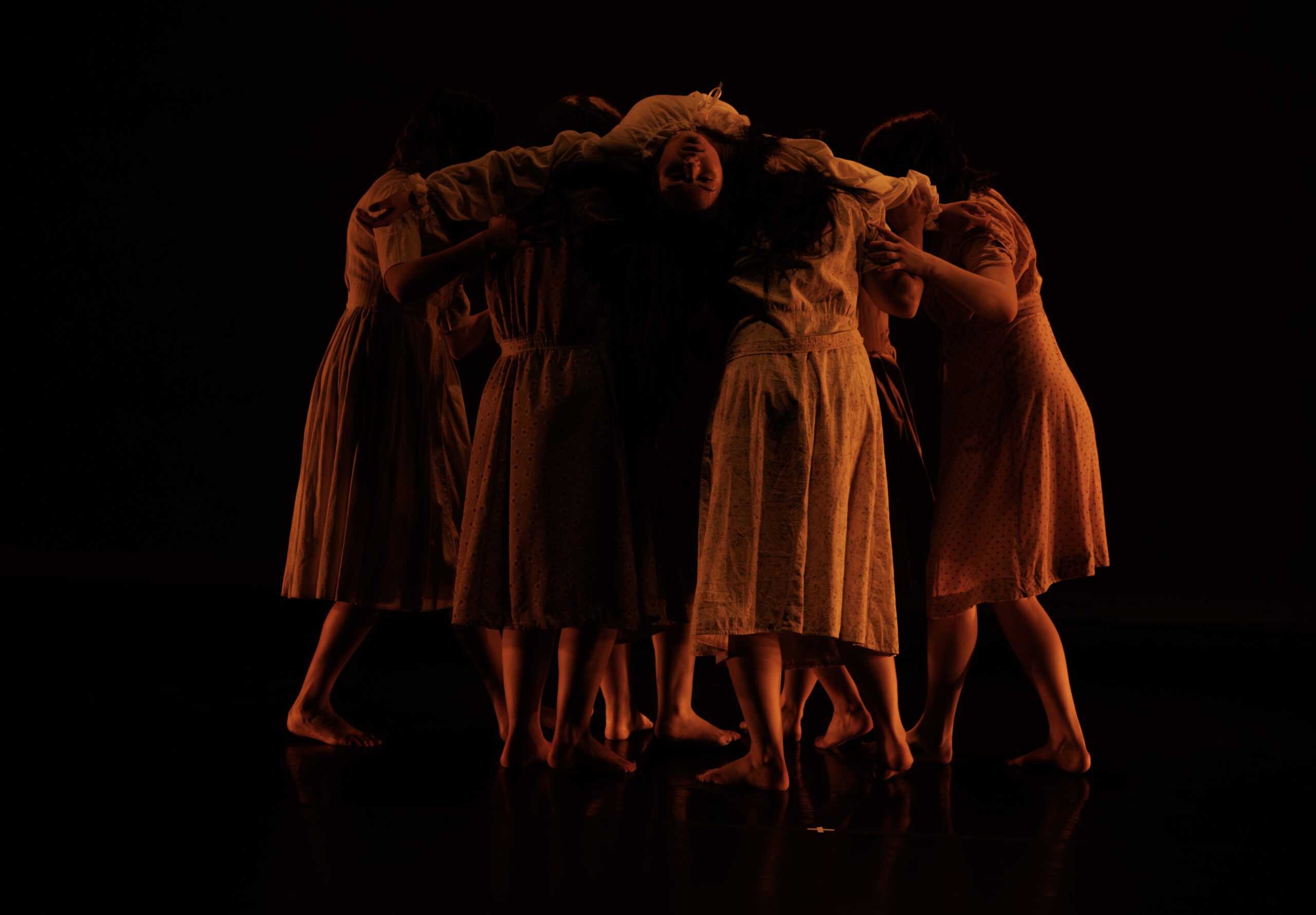Youth is wasted on the young. Or so the saying goes. A time of life that, in my experience of it, often felt like a time of T… I… M… E… That time stretched on forever. Its passing celebrated, its slowness lamented, its end anticipated. If I could go back, I’d tell my young self to slow down and enjoy it. Looking back, I remember moments in the company of friends when we filled it with the kind of nothing that becomes something. Were I to inhabit that stage of life now, I doubt I’d recognize it. As the parent of a young child, I struggle to remind myself what a luxury it is to give him time, space, emptiness—freedom to encounter the world with no agenda.
Watching SEX TAPE, Gabrielle Revlock’s duet performance with Michelle Tantoco, at the Barnes Foundation’s Artist Bash last weekend, I reconnected momentarily with that freedom of youth, luxury of time, ease of relationship. The Barnes’ three-hour party gathered dance, music, and fashion in the museum’s glamorous event space under the collective title Take Me Home, in order to probe the definition of home by questioning: is home “a place, a memory, or a person?”
On a postage stamp of a stage—a raised platform that fits the two dancers length-wise, topped by a small red rug—Revlock and Tantoco engage in a soft-edged, slow-moving, ever-transforming, mostly seated hug. Kneeling, considering Tantoco’s head on her thigh, Revlock gently rubs her cheek, caresses and tugs the edges of her ear, strokes fingers through her hair. They shift to face one another, settle ears to cheeks, whisper sounds we cannot discern, nestle and cradle one another’s heads, nuzzle like kittens. Eyes closed, entwined in Revlock’s embrace, Tantoco rhythmically grasps and releases Revlock’s shirt. Revlock’s fingers graze down Tantoco’s arm, slide under a cap sleeve to grab the flesh and knead the bone beneath.
A row of comfy-cold black leather couches lines the square perimeter of the stage. Two blinding searchlights illuminate the pair like fugitives, or an installation. Another performance is underway on the other side of the couches, their quirky music colonizing my headspace. I am relieved when the noise subsides.
The duo’s positions evolve, they tickle and tease one another, wrestle and tackle, make silly faces and giggle. Cradling Revlock like a baby, Tantoco pecks her on the cheek. Revlock rests her head to Tantoco’s heart, rubs the sleep from her eyes, bolsters her limp body as if re-enacting the Pietà. Their hands meet, fingertips tent and pulse, palms connect. They gaze at one another. They look away.
Much of the duet is on knees, the posture a peculiar blend of childlike innocence and something more suggestive. A gauzy sweetness hangs over the duet, conjuring the early days of a relationship, when you could happily laze in an ever-shifting cuddle for days. When you offer not only your heart and your body, but the most precious commodities in our modern lives—your time, your attention, your presence.
Disentangling intimacy and sex, the analog title and ultimately G-rated content render voyeurism both scintillating and quaint, recall what my memory rose-colors a less terrifying era. When the videographer sits next to me, I peek through his camera, steal a glance that isn’t quite mine, grasp for a moment the excitement of watching.
Part 2 of a larger investigation of power, care, and gender titled Manifesto, SEX TAPE features the “found choreography” of video documenting Revlock and a male lover, “recreated” with a female friend. Revlock’s exploration of physical touch between friends is timely, as recent scholarship and pop culture profiles of female friendship have questioned the precedence accorded to romantic love.[1]
In a conversation with Revlock during the Bash, shortly before her performance, she shares with me screenshots of text exchanges with prospective male internet “dates” that also served as fodder for the piece. Depressing if not unsurprising, “why can’t I treat you like an object?” is the general gist. I get it, even as I think, You don’t need these silly posts. Opposing the work to these posts gives them a platform they don’t merit, implies a universality (I hope) they don’t indicate.
“Falling asleep is a definite possibility,” Revlock confesses to me, acknowledging the work’s pacing. I appreciate the invitation, her handing over of the experience: Do with it what you like, far be it for me to dictate its reception. Rather than give in to sleep, I think back on times with friends, their pacing reminiscent of my experience of the piece. Hours on end driving and chatting, no destination in mind. Lazy afternoons in forbidden fields. A midsummer picnic full of cartwheels and tree climbing. Dinners extending into the wee hours, talk of partners and children and careers and adventures that are to be and not to be. Anticipating and forecasting real life, contemplating the other side of all this play.
There are memories of romance too; they feed me in a certain way, but these aren’t the people I reach for in a time of need. Circumscribed, commodified to the point of unintelligibility, love is indeed strange, for we have made it so. It is a minor revelation to place friendship on its pedestal, to honor that particular brand of closeness, equate it with home.
SEX TAPE, Gabrielle Revlock, at Artist Bash: Take Me Home, The Barnes Foundation, February 16.
[1] See, for example: All The Single Ladies, You’re the Only One I Can Tell, The H-Spot, Broad City, Two Dope Queens, Insecure, Girls, The Atlantic’s The Friendship Files.






